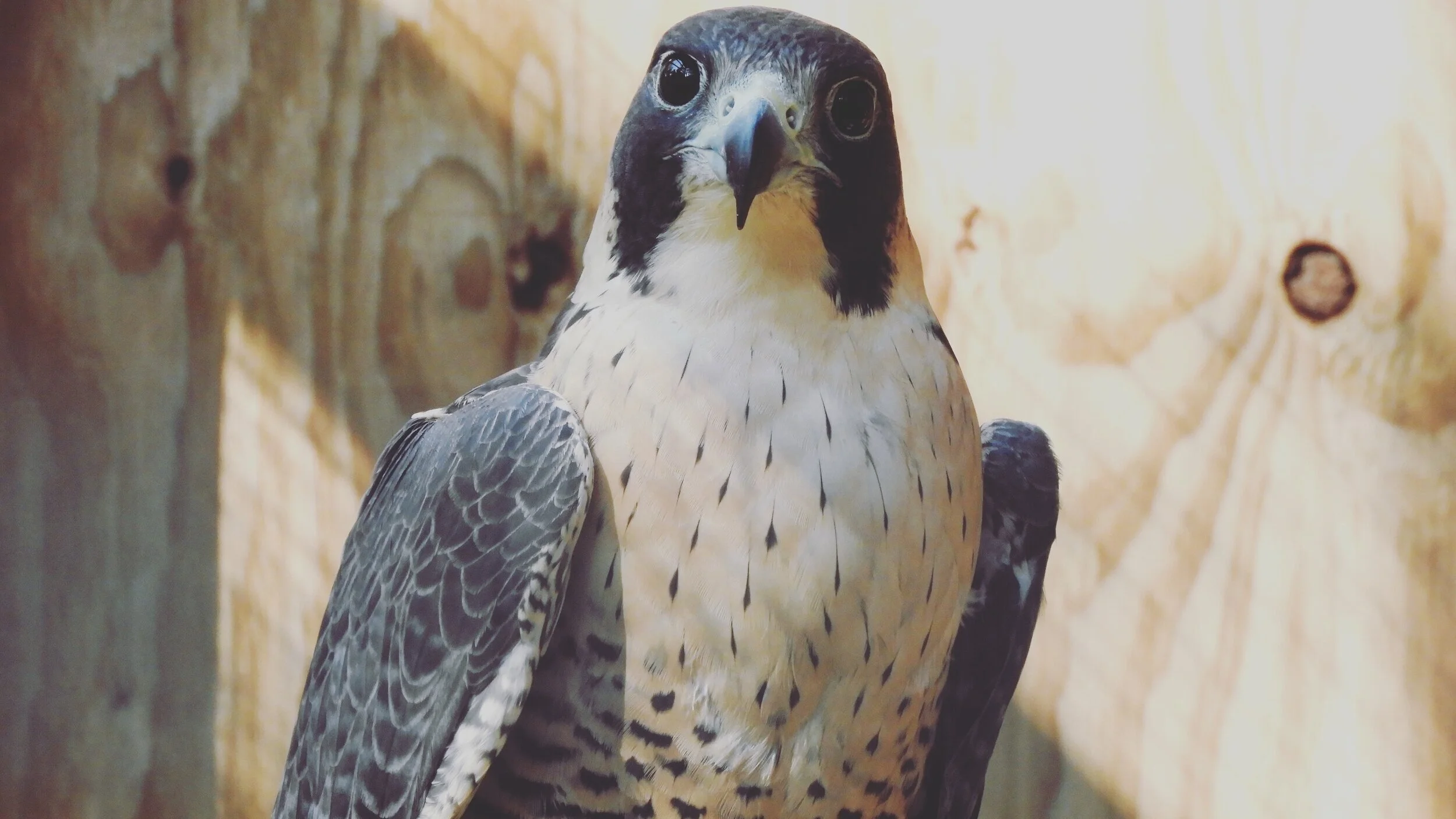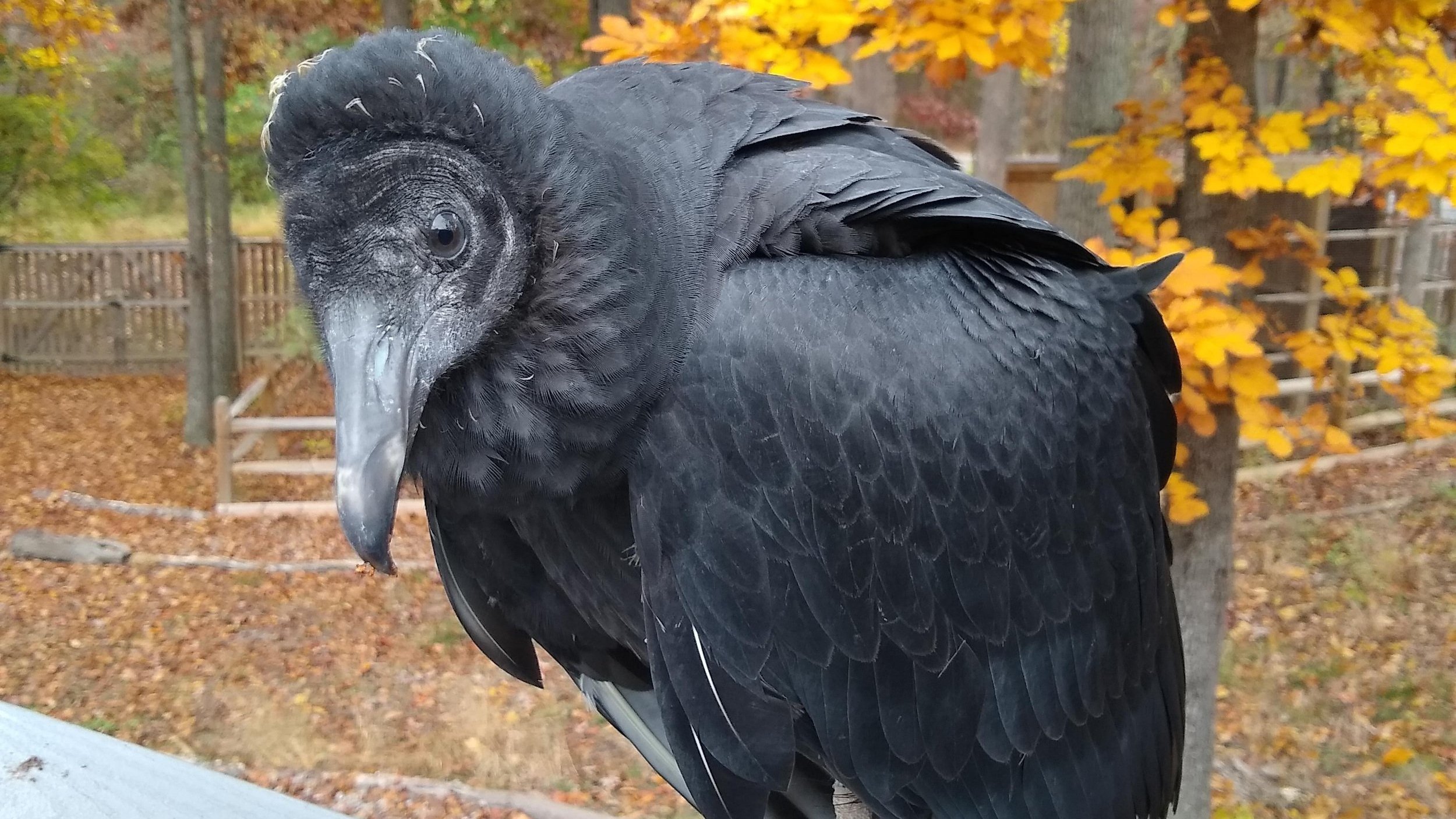Ambassadors
Our Wildlife Ambassadors are former patients whose injuries or behaviors have rendered them non-releasable. More than half of them were illegally kept as pets, poached from the wild, or have long-term physical setbacks that would prevent them from surviving in the wild. They now play a crucial role in helping us educate the public about native wildlife, human-wildlife conflicts, habitat protection, and environmental stewardship.
Our unique Wildlife Walk offers visitors the opportunity to see our Ambassadors up close and learn about their species and personal stories as they tour the enclosures. Each of our education ambassadors receives personalized housing, species-specific diet plans, and veterinary care. They also benefit from daily training sessions and enrichment schedules to ensure they have the best possible life while in our care.
Avians
Goose, Peregrine Falcon
Goose came to us as a second-year juvenile in February of 2017 from another facility in northern Virginia. She had been struck by a small airplane at Dulles Airport. The strike caused severe injuries to her metacarpals (essentially her fingers) which required amputation of her metacarpals and primary flight feathers of her left wing. Her injuries mean that she can not fly and therefore could not be released back into the wild.
Gryllz, Red-tailed Hawk
Gryllz came to us in 2017 as a first-year juvenile. Gryllz had been struck by a vehicle and later found tangled in the grill of a pickup truck when the driver reached home. He suffered a fractured wing and damage to his right eye. The wing was surgically reparable and he is fully flighted, but with no vision in his right eye, he is unable to hunt successfully.
Kevin, American Kestrel
Kevin came to BRWC in 2021 after he was illegally and inappropriately kept as a baby by tourists who, upon realizing they couldn't take him on an international flight back home, dropped him off at a police station. Unfortunately, the damage was done—he was completely habituated and had no fear of people whatsoever, even trying to perch on them when given the opportunity. A bird this friendly could not be safely released into the wild. Though we are devastated that he cannot be released, we are glad that he will educate the public about his species and live out the rest of his life with us!
Wednesday Addams, Black Vulture
Wednesday Addams was admitted to the Center in 2020 as an imprinted nestling. Her egg had been found abandoned after the shed structure it had been laid in came down. Against BRWC advice, the finder incubated the egg and hatched it successfully. Due to this, she became imprinted on humans. As soon as she was surrendered to the Center, staff introduced her to other juvenile and adult vultures in care in the hopes that she would overcome her imprinting and learn proper behavior from them. Though she did seem to act appropriately with other vultures, she continued to seek out human interaction. After several months, it was deemed unsafe to release her, as she might continue to behave this way towards humans, which would be dangerous for both her and people.
Moira Rose, Turkey Vulture
Moira Rose came to BRWC in 2020 as a nestling. She was brought to us by the Department of Wildlife Resources, who had responded to a call about a bird in a box at a boat launch ramp. She was too young to be on her own and overly friendly for her age on intake, leading staff to believe that she may have been raised by people for some time before being abandoned. Despite BRWC staff's efforts to discourage her behavior around people, she maintained her friendly attitude, seeming to prefer humans to the other vultures. As with our Black Vulture, it was deemed unsafe to release her with this behavior, as her seeking out humans could be dangerous for both parties.
Mammals
Bear, Striped Skunk
Bear came to the Center in the summer of 2022 as a transfer from another organization. As a kit, he had been abducted and the finders had attempted to keep him as a pet. Once it was discovered that pet skunks are illegal to own in Virginia, he was surrendered to a wildlife rehabilitator who deemed him too habituated to be released. He became a resident with Wildlife Ambassadors until the organization stopped operations in 2022, and he was transferred to BRWC care.
Aster, Virginia Opossum
Aster was found as a joey when a dog brought her into someone's house. During her crucial first few weeks, the dog's owner kept her, which prevented her from learning natural behaviors. This early human contact caused her to become habituated to people, associating humans with food. Once she was brought to an appropriate rehabilitation center, it was clear that she could not be released back into the wild.
Mocha, Striped Skunk
Mocha came to BRWC in 2021 when she was 1 year old. This leucistic (light-colored) striped skunk was brought to us by the Virginia Department of Wildlife Resources after being confiscated. It is not legal to have a skunk as a pet in Virginia, but sadly, that does not prevent wildlife from being bought and sold. Once this illegal pet was discovered, confiscation and placement at an educational facility, like Blue Ridge Wildlife Center, was the best option.
Muffin, Virginia Opossum
Muffin was brought to BRWC during the spring of 2024. She spent the first year of her life in a basement with a dog and a cat, as an illegal pet. She was never able to learn how to be a wild opossum while being an illegal pet. Due to her friendly demeanor and inability to survive in the wild, we decided to keep her as full-time ambassador.
Gizmo, Virginia Opossum
Gizmo came to the Center in the summer of 2022 as a patient who suffered severe injuries to his tail and multiple fingers. The tail and portions of multiple digits were amputated and without these missing parts, it would make it very difficult to balance, grab onto trees to escape predators, or even gather leaves for winter den insulation. We will provide him with the best life possible right here at BRWC!
Jasper, Red Fox
Jasper came to the Center in the summer of 2022 as a transfer from another organization. He had been purchased from a breeder and illegally brought into Virginia, where he was later surrendered to DWR and placed with Wildlife Ambassadors. When the organization stopped operations in 2022, he was transferred to BRWC care.
Reptiles
Jessie, Wood Turtle
Jessie was brought to us from a farm supply store after a volunteer for the Center overheard the finder talking to the clerk about their “cool find” and how friendly the turtle was. Worried the people would not return the turtle, she suggested that she take it to the Center to be “looked over”, in case the friendliness was a sign of illness. Without an exact found location, the turtle cannot be released back to the wild. It was also noted at intake that she has an abnormal eye, which may affect her visibility and survivability.
Tugboat, Wood Turtle
Tugboat was struck by a car and brought to us in 2014. She suffered from a crack in her carapace, which eventually ended up leaving an exposed area of her body. The fracture also damaged part of her spine, resulting in lameness in her rear leg. The leg began to slough and die, and it was amputated to help fight any ongoing infection. The wide gap in the shell prevents her from being released because of a higher risk of infection.
Quasi, Woodland Box Turtle
Quasi was admitted in the fall of 2015 as an adult. She was found when a homeowner was weed whacking and accidentally hit Quasi, removing a piece of her beak and cutting into her front leg. Though her injuries were simple and easy to fix, her overall appearance was severely deformed: her hinge is fused and does not allow her to close herself off from predators; her shell is much too small for her body; and her toes and feet are visibly deformed. Due to her inability to pull herself into her shell safely, she cannot be released, since she would be an easy snack for a raccoon or other predator. Most likely she was raised from a young age by humans and did not receive the proper nutrients needed to grow into a healthy, appropriately-formed turtle.
Sheldon, Woodland Box Turtle
Sheldon was found in the road and brought home from the wild to be kept as a pet for 3 years. It was believed by the finders that the area he was found in was inappropriate for turtles. The person called us after Sheldon stopped eating. Unfortunately, he did not receive enough calcium, vitamin D and sunlight while in captivity, so he developed metabolic bone disease which affected the normal growth of his shell. It is concave in places and slightly warped and was much worse on intake.
Slim, Eastern Ratsnake
Slim was admitted to the Center in 2015 after being found stuck to a glue trap. The terrified homeowner called Fauquier County Animal Control who brought the snake to us to be safely removed from the trap. The snake had damaged scales from struggling to get off the trap and was given antibiotics. While waiting for her to shed to see if the damage was healed, her unnatural, friendly nature was discovered, and she became part of our wildlife ambassador team.
Shelly, Woodland Box Turtle
Shelly was injured in 2008 when she was hit by a car. Her shell was cracked and her leg so badly broken the foot needed to be amputated. Worried that she would be unable to properly dig a hibernaculum or a nest, we decided to keep her for education. We were also concerned that her large size would put stress on her stump, causing sores.
Freddy Cooter, Northern Red- Bellied Cooter
Freddy was found by a woman who stopped kids from throwing rocks at him in a local lake, he was floating sideways and unable to swim properly. After a medical assessment, we discovered that Freddy had pneumonia. He was treated for his lung infection but, he has scar tissue remaining in his lung. Freddy is still not able to swim or dive properly on his own, which prevents him from evading predators and finding food. Due to his buoyancy issues, he was not able to be released.
Scuter, Diamondback Terrapin
Scuter, the name, is a nod to the unique patterning of her scutes, the bony plates on a turtle’s shell.
Scuter came to us in 2020 as a surrendered pet. Collecting these turtles from the wild and keeping them as pets is not legal in our state. Their population along our eastern shore was decimated in the early 1900s due to demand for the turtles as a food item. Now, with continued habitat loss, deaths caused by car and boat collisions, and crab trap-caused drownings, terrapin populations are still struggling in Virginia.



















